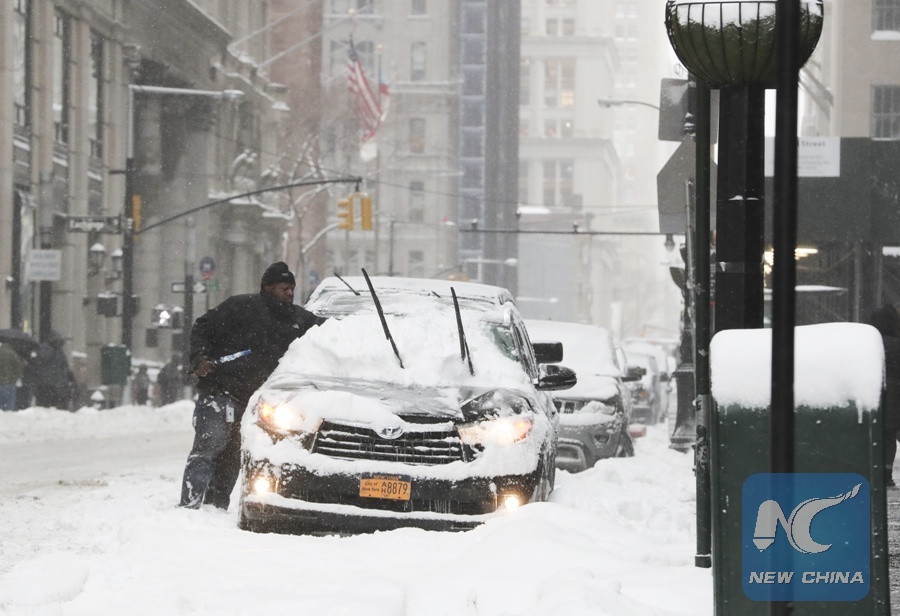
A man clears snow on his vehicle in New York, the United States, on Jan. 4, 2018. (Xinhua/Wang Ying)
by Xinhua writer Yang Shilong
NEW YORK, Jan. 10 (Xinhua) -- Four days after her arrival at John F. Kennedy (JFK) International Airport, Gabby Xiong has not seen her luggage sent home.
"I feel so frustrated," Xiong, who is studying at North Carolina State University, told Xinhua on Tuesday. "I've called Air China several times and was told JFK lacks manpower to handle stranded travelers' bags."
The U.S. fifth-largest airport by passenger count has seen over 7,000 flight cancellations and 200 plus diversions after last Thursday's winter storm.
About a dozen arriving international flights were stuck on JFK's tarmac for at least four hours due to a shortage of open gates.
CASCADING EFFECTS OF INFRASTRUCTURE BREAK
"It's a nightmare," said Xiong, recalling her last weekend's flight from Beijing to New York.
The young Chinese lady landed at JFK Saturday morning after a 14 hour flight on CA 989 only to sit on the plane for nearly another seven hours while it was waiting for a gate.
Then Xiong waited in vain several hours more for her baggage to arrive on a carousel at Terminal 1. At last, she had to leave her contact information with Air China before flying back to Raleigh, N.C.
"I do not blame Air China for this, though it needs to improve its crisis management service," she said. "JFK is probably responsible for a large part of the problem. The aging airport was apparently not prepared for such a storm."
The entire JFK was a mess well before Sunday when a water main broke at Terminal 4, the main international terminal, leaving three inches of standing water that knocked out the power and heat for a time.
The water main break at JFK International Airport is "an example of the cascading effects of an infrastructure break," commented Casey Dinges, senior managing director, the American Society of Civil Engineers (ASCE), in an email interview with Xinhua on Tuesday.
"America's infrastructure sectors are interdependent," Dinges said. "This pipe burst was just one example demonstrating that when something with infrastructure goes wrong, it can be followed by a number of additional problems."
"Unfortunately, this pipe break coincided with other logistical and weather challenges at the airport, exacerbating the disruption to travelers," he said.
SERIOUS IMPLICATIONS ON U.S. ECONOMIC FUTURE
In its quadrennial report on U.S. infrastructure in 2017, ASCE gave the country a "D+" or failing grade for the state of its bridges, roads, dams, drinking water, ports, airports, railways and school buildings.
Since ASCE released the first Infrastructure Report Card in 1998, the overall grade for America's infrastructure has continued to receive D averages, Dinges said, adding this can be attributed to "the failure to close the 2 trillion U.S. dollar, 10-year investment gap."
"If the U.S. continues to only pay half of its infrastructure bill, we will begin to see serious implications on our country's economic future including 2.5 million lost jobs and a 3.9 trillion dollar decrease in GDP, as well as falling business productivity and a reduced disposable income for every American family," he said.
Dinges expressed his hope President Donald Trump will announce his plan for infrastructure investment within the next few weeks.
As a key part of his "Make America Great Again" campaign pledge, Trump has proposed investing 1 trillion U.S. dollars over 10 years to upgrade the country's infrastructure, which he described as being on a par with "a third-world country."
A total investment of 4.59 trillion dollars would be required to lift the U.S. infrastructure from a D+ to a B grade, ASCE projected.
"Infrastructure has been on the backburner for far too long in our country. It's time to make it the legislative focus," Dinges said.
A bipartisan group of U.S. senators met with the administration officials on Tuesday to discuss drafting legislation on improving the country's infrastructure.
The U.S. currently ranks 12th out of 138 countries for the quality of infrastructure, according to the World Economic Forum.

